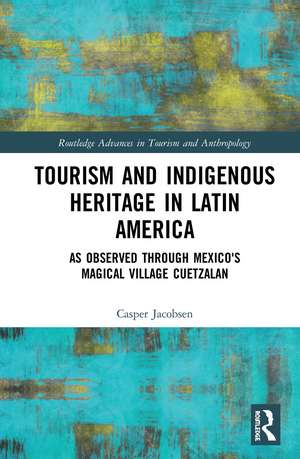Tourism and Indigenous Heritage in Latin America: As Observed through Mexico's Magical Village Cuetzalan: Routledge Advances in Tourism and Anthropology
Autor Casper Jacobsenen Limba Engleză Paperback – 30 iun 2020
Following the surge of regional multiculturalism and indigenous political mobilization, how are indigenous Latin Americans governed today? Addressing the Mexican flagship tourist initiative of ‘Magical Villages,’ this book shows how government tourism programs do more than craft appealing tourist experiences from ideas of indigeneity, tradition, and heritage. Rather, heritage-centered tourism and multiculturalism are fusing into a strategy of government set to tame and steer indigenous spaces of negotiation by offering alternative multicultural national self-images, which trigger new modes of national belonging and participation, without challenging structural political and social asymmetries.
By examining contemporary Mexican tourism policies and multiculturalist ideals through policy analysis and ethnographic research in a mestizo municipalcapital in a majority indigenous Nahua municipality, this book shows how mestizo nationalism is regenerated in tourism as part of a neoliberal governmentality framework. The book demonstrates how tourism initiatives that center on indigenous cultural heritage and recognition do not self-evidently empower indigenous citizens, and may pave the way for extracting indigenous heritage as a national resource to the benefit of local elites and tourist visitors.
This work is of key interest to researchers, advanced students, and critically engaged practitioners in the fields of Latin American studies, indigenous studies, social anthropology, critical heritage studies, and tourism.
| Toate formatele și edițiile | Preț | Express |
|---|---|---|
| Paperback (1) | 259.98 lei 6-8 săpt. | |
| Taylor & Francis – 30 iun 2020 | 259.98 lei 6-8 săpt. | |
| Hardback (1) | 763.89 lei 6-8 săpt. | |
| Taylor & Francis – 20 aug 2018 | 763.89 lei 6-8 săpt. |
Preț: 259.98 lei
Preț vechi: 311.41 lei
-17% Nou
Puncte Express: 390
Preț estimativ în valută:
49.75€ • 51.63$ • 41.58£
49.75€ • 51.63$ • 41.58£
Carte tipărită la comandă
Livrare economică 15-29 martie
Preluare comenzi: 021 569.72.76
Specificații
ISBN-13: 9780367587352
ISBN-10: 0367587351
Pagini: 204
Dimensiuni: 156 x 234 mm
Greutate: 0.45 kg
Ediția:1
Editura: Taylor & Francis
Colecția Routledge
Seria Routledge Advances in Tourism and Anthropology
Locul publicării:Oxford, United Kingdom
ISBN-10: 0367587351
Pagini: 204
Dimensiuni: 156 x 234 mm
Greutate: 0.45 kg
Ediția:1
Editura: Taylor & Francis
Colecția Routledge
Seria Routledge Advances in Tourism and Anthropology
Locul publicării:Oxford, United Kingdom
Public țintă
Postgraduate and UndergraduateCuprins
Prologue: Hope and despair in Cuetzalan 1. Introduction 2. Governing frames 3. Working the translocal field 4. The diachronic Magical Villages Program. Frames and technologies in motion 5. When pros turn pro: Community ambassadors and social order 6. Multicultourism in the Magical Village: Setting temporality and translocality 7. Networking/rooting: Ritual co-parenthood in Tzinacapan 8. Regenerative fiesta: ritual configuration of history, identity, and society Epilogue
Notă biografică
Casper Jacobsen holds a PhD in American Indian Languages and Cultures, and is a postdoctoral fellow at the University of Copenhagen and the State University of New York at Albany, USA. His research focuses on the history and heritage of indigenous peoples in pre-Hispanic, colonial, and contemporary Latin America.
Recenzii
"Going beyond the sustainability and empowerment frameworks frequently employed in the tourism literature, Casper Jacobsen’s Tourism and indigenous heritage in Latin America: As observed through Mexico’s Magical Village Cuetzalan offers the reader a critical examination of the emergence of multicultourism, defined by the author as a neoliberal governmentality frame that fuses multicultural politics of recognition with tourism, while conceptualizing indigenous heritage as a ‘national resource’ to be exploited in tourism initiatives." - Laura Paola Vizcaino-Suárez, Journal of Heritage Tourism
"Although this book analyses a specific Mexican community, it offers crucial insights into the global politics of recognition in the name of tangible and intangible heritage, especially UNESCO’s World Heritage programme..Jacobsen’s discussion of his methodological approach in Chapter 3 includes a thoughtful description of his interview process and the challenges and benefits of doing field research while accompanied by family members. These sections would be especially helpful for early-career scholars preparing to embark on their own projects...It provides a concrete example of the perils of the politics of recognition for marginalized communities by revealing how the official embrace of Indigenous heritage can function as yet another form of dispossession, and is thus of interest to a broad range of scholars of tourism, heritage studies and Indigenous studies, and scholars of the politics of recognition in and beyond Latin America." Lisa Pinley Covert, Journal of Latin American Studies
"Although this book analyses a specific Mexican community, it offers crucial insights into the global politics of recognition in the name of tangible and intangible heritage, especially UNESCO’s World Heritage programme..Jacobsen’s discussion of his methodological approach in Chapter 3 includes a thoughtful description of his interview process and the challenges and benefits of doing field research while accompanied by family members. These sections would be especially helpful for early-career scholars preparing to embark on their own projects...It provides a concrete example of the perils of the politics of recognition for marginalized communities by revealing how the official embrace of Indigenous heritage can function as yet another form of dispossession, and is thus of interest to a broad range of scholars of tourism, heritage studies and Indigenous studies, and scholars of the politics of recognition in and beyond Latin America." Lisa Pinley Covert, Journal of Latin American Studies
Descriere
The book assesses current multiculturalist policies in Mexico and how they affect local indigenous populations. The book examines a state tourist initiative of "Magical Villages" where tourists can have special experiences linked to ideas of indigeneity, tradition and heritage. The argument is that this policy acts as a way to contain, constrain








